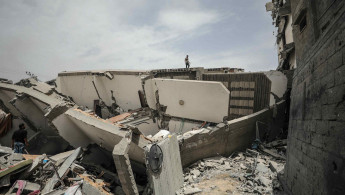Gaza ceasefire agreement aims to end attacks on Palestinians
The agreement reportedly came into force at 4am on Monday morning, bringing to a halt exchanges of rocket fire and devastating airstrikes which killed 24 Palestinians, including two pregnant women and a 14-month-old baby, and four Israelis.
Neither side has officially announced a ceasefire, however, the Israeli army on Monday lifted protective restrictions on residents in southern Israel.
Hamas' Al-Aqsa TV in the Gaza Strip meanwhile reported a ceasefire, signaling a deal had been reached to bring an end to the deadliest fighting witnessed in the embattled Gaza Strip since 2014.
The ceasefire agreement, brokered in Egypt, includes assurances that Israeli forces will not fire on peaceful protesters taking part in marches at the border between the Gaza Strip and Israel, sources said.
More than 200 people have been killed so far in the Great Return marches, held weekly for more than a year.
Other conditions of the agreement included the expansion of Gaza's fishing zone to 15 miles beyond the coast, and an understanding that power plants in Gaza will be able to increase the production of electricity, during the Muslim fasting month of Ramadan.
Gaza's fishing zone was extended from six nautical miles to 15 last month in an unofficial deal between Hamas and Israel.
But the fishing zone was reduced to six nautical miles once more last week, with Israel citing rocket fire from the strip as the reason. The fishing zone was then closed altogether on Saturday, until further notice.
Israel will also required to ease imports into and exports out of the Gaza Strip and cease the targeted killings of political leaders, militants and activists.
Gaza has for decades suffered a catastrophic shortage of electricity and is stricken by frequent elecricity cuts.
In return, Palestinian factions must vow to cease all attacks on Israeli forces and civilians, lest the deal be wiped off the table.
But in an unprecedented move, Palestinian factions at the negotiating table stipulated that the ceasefire would only be agreed upon if it was extended to include Palestinians in the West Bank and occupied East Jerusalem, Egyptian sources claimed.
Israel will also be required to ease security measures in the West Bank and East Jerusalem, cease attacks on Palestinians in these territories, and provide better facilities for Palestinian prisoners in Israeli jails, the Gaza-based factions requested.
The Egyptian and Palestinian sources said that the tough-to-broker deal had been spurred on by a Hamas attack on a "prominent Israeli military target" carried out on Sunday night.
Qatari assistance in the negotiations was also crucial, according to a Hamas source.
Israel reportedly agreed to a Qatari grant for employees in the Gaza Strip.





 Follow the Middle East's top stories in English at The New Arab on Google News
Follow the Middle East's top stories in English at The New Arab on Google News
![The UAE is widely suspected of arming the RSF militia [Getty]](/sites/default/files/styles/image_330x185/public/2024-11/GettyImages-472529908.jpg?h=69f2b9d0&itok=Yauw3YTG)
![Netanyahu furiously denounced the ICC [Getty]](/sites/default/files/styles/image_330x185/public/2024-11/GettyImages-2169352575.jpg?h=199d8c1f&itok=-vRiruf5)
![Both Hamas and the Palestinian Authority welcomed the ICC arrest warrants [Getty]](/sites/default/files/styles/image_330x185/public/2024-11/GettyImages-2178351173.jpg?h=199d8c1f&itok=TV858iVg)